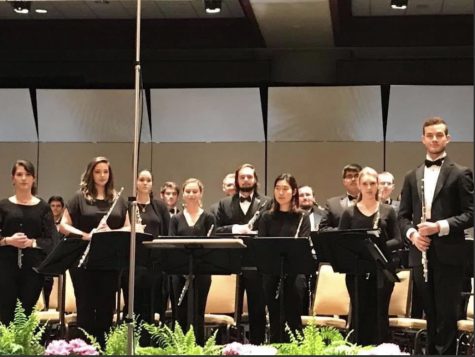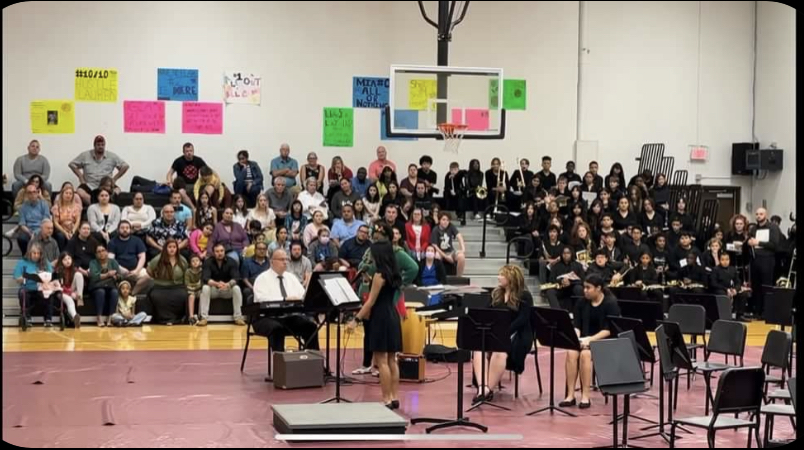The Instrument to the Mind
Band and choir performing at their concert in the gym.
March 10, 2023
Being able to play an instrument or to sing a song can help refocus bad energy into an enjoyable and helpful mindset, which can help reduce stress on a teenager’s mind.
“I think that the arts is a place where students can express themselves through music because if you think of other subjects at school, you’re limited to solving preset problems. But in music class, you get to have a lot more freedom and creativity with how you express yourself and we’re connecting and sharing with other people,” Band teacher Mr. Jeremy Jones said.
Many students learn to play an instrument through school programs, but some are self-taught. Mentally, musically inclined students find help through connecting with their emotions and expressing themselves through performance. This connection is often borne from hard work.
“It is discipline with routine, a great discipline with your practicing because you have to practice to get better. I think personally, I think playing music, you have to be really yourself to play music. Because you know what you like and what you don’t like and what you like reflects who you are as a person, like your music tastes reflects who you are. I think playing music and even writing music lets you get in touch with that side of yourself that you might not even tell other people about,” Mr. Jones stated.

Playing an instrument or learning a song is not always as easy, not only does it involve your mind but also your body. Playing or singing new music helps you develop new techniques and helps you memorize new tricks.
“Usually, we have this thing called a singer stance, it’s where you put one foot slightly in front of the other. We tend to have a wide base like shoulder length and then you breathe from your diaphragm, that’s where all your air is coming from. And we round vowel so like, you look like a duck when singing. You do this to sound more nice. Also, to slightly bend your knees so that you have a less chance of fainting. Especially when there’s a lot of spotlight on you. There’s a lot of things that you do, and the biggest part is breath support,” Sophomore Mia Villanueva said.
The process of learning music involves playing in front of others. This could include performing in front of teachers, family, and friends or performing at a concert. Over time students like Villanueva tend to grow confident by getting comfortable while performing, by performing more.
“I just get really nervous sometimes before the spotlight is on me. I’m usually like, anxious and tense and I usually fidget a lot, I just get really nervous, but the more I practice and grow confident, the more I get used to it,” Villanueva explained.
Being a band or choir teacher allows you to be creative in your learning environment. Learning and teaching music involves creativity and communication.
“Since I don’t really have (any) standardized testing, there are standards for music that I have to follow. But I let the students choose a lot of what we do in class, which I think is important, they’re allowed to choose what songs we do, and they get to see the creativity of many different songs. So, they get to play lots of songs and whatever they feel they connect with,” explained Mr. Jones.
Like getting a scholarship for playing a sport, you can be gifted a full ride scholarship for playing an instrument.
“It’s just like sports, or anything you can get scholarships for, music is just another one of those ones that you can get. I played oboe, which is not a common instrument. When I auditioned at a lot of colleges, I got many offers from different schools. Private schools, especially if you play a not common instrument, you can get a lot of money, a lot of money, but I went to a public institution, UF, and they gave me a decent amount of money to go play oboe there. As long as I played in an ensemble every semester, I was able to keep my scholarship and it was based on my skill level at my audition,” discussed Mr. Jones.
Music can help a stressed teenager or adult “get away” from reality. It reliefs pressure, reduces stress, and produces discipline. This is the case for Senior Luis Lugo who plays guitar, piano, drums and conga.
“It’s just like a distraction; it helps me clear my mind from whatever is happening at the moment. Every instrument and form of music in general, it doesn’t matter if I’m playing it or listening to it, it just helps clear my mind and helps calm me down,” Lugo said
Music is a form of communication, can even be considered a form language. Music can give you the chance to create music of your own and express your own voice.
“There’s no rules for writing music. There’s no rules to any of it. You have a blank canvas, much like art to share your ideas. So, the more words you’ve learned by practicing your instrument, the better you can express yourself with it, and you learn that you have, I like to say dialect when learning. You learn based off how other people have played and you’re basically growing, I say the cumulative musical language, and we’re developing that all the time,” Mr. Jones stated.



